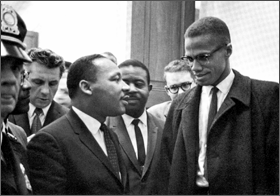Welcome to the Pigeonhole: The Branding of Black Leadership...
I read this article on Dell Gine's site.
Read on...
http://www.dellgines.com/?p=632#more-632
==============
Welcome to the Pigeonhole: The Branding of Black Leadership
Blogged under Social Commentary by Dell on Friday 1 September 2006
What is a ‘black leader’ anyway?
If we go by the adjective as a modifier approach a black leaders is simply someone that is ‘black’ leading others irrespective of those being led’s class or color. We however know that is not the case. A black leader in reality is defined as one who leads black folks. From a real world perspective, a black leader is defined as a black person who has influence and sway over blacks on a national, state, or local level at grassroots points (Farrakhan, etc.), politically (Jesse Jackson, Al Sharpton, etc.) or spiritually through the Church (TD Jakes, etc.) . If you truly observe you will see those are the three general categories in which today’s American black leadership is expected to operate. That is why Bill Cosby isn’t considered a ‘black’ leader, Condoleezza Rice isn’t considered a ‘black’ leader, and Bob Johnson the black billionaire isn’t considered a ‘black’ leader.
The problem with the arbitrary limitation and mass acceptance of the definition of black leadership is twofold:
1. It pigeonholes blacks who demonstrate strong leadership characteristics and abilities in areas outside of the ‘big three’ leadership areas that I mentioned above. Perception becomes reality and conditioning determines perception. When someone who doesn’t fit the ‘traditional’ paradigm of black leadership arrives on the scene they are either rejected, or expected to eventually conform to the commonly held perception fo what black leadership is. The pressure is put on the leader to conform not only by black folks but also by whites, as both groups find comfort in what they understand and what has historically been true.
Even Malcolm X suffered the pigeonhole effect: One of the major troubles that I was having in building the organization that I wanted-an all-Black organization whose ultimate objective was to help create a society in which there could exist honest white-Black brotherhood - was that my earlier public image, my so-called “Black Muslim” image, kept blocking me. I was trying to gradually reshape that image. I was trying to turn a corner, into a new regard by the public, especially Negroes; I was no less angry than I had been, but at the same time the true brotherhood I had seen in the Holy World had influenced me to recognize that anger can blind human vision. (Autobiography, pp 320, 381) - Malcolm X
2. It pigeonholes blacks from of a broader perspective of being able to speak and have credibility in speaking to quote - unquote ‘non-black issues’. Intelligent, intuitive, and understanding black leaders who have a broad understanding of issues that aren’t traditionally considered ‘black’ issues have their opinions marginalized or minimized because, “Why aren’t they talking about things that black people need”? Probably the most salient example is Martin Luther King Jr. attempting to transition from Civil Rights Leadership to tackling the issue of Vietnam as seen in his 1967 speech Beyond Vietnam: A Time to Break Silence:
Over the past two years, as I have moved to break the betrayal of my own silences and to speak from the burnings of my own heart, as I have called for radical departures from the destruction of Vietnam, many persons have questioned me about the wisdom of my path. At the heart of their concerns this query has often loomed large and loud: Why are you speaking about war, Dr. King? Why are you joining the voices of dissent? Peace and civil rights don’t mix, they say (King, 1967).
Recognized as the greatest Civil Rights Leader or ‘black leader’ of the modern era, even when Dr. King himself attempted to step out of the pigeonhole and lead not just on black issues but on an ‘American/Global’ issue people questioned him for it.
For black folks to continue our ascension to our rightful place in American society and in the Global community, we have to allow our black leaders to truly become black leaders. We need leaders to take the lead on specific issues relevant to our condition as black men and women in America. However we should not limit black leaders to only having a voice on conditions relevant to black America. We have more to talk about than just ‘black’ things and we can talk about them from more than just a grassroots, faith based, or political perspective. As our society has transitioned into globalism and the age of information and the stressors and possibilities of those transitions affect America in general and blacks specifically, so to must blacks in leadership expand in the way in which they lead.
Blacks can lead more than just blacks and they can lead in more diverse ways but for us as black folks, for America, and the World to reap the benefits of our black leadership potential we must adapt and shut the pigeonhole down and allow new leadership paradigms and models to lead in a new way for a new era.
================
Dell writes some deep stuff, doesn't he?


0 Comments:
Post a Comment
<< Home